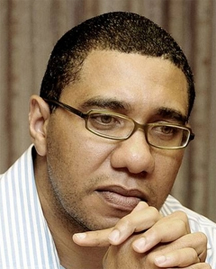(Jamaica Gleaner) Despite renewed pressure from Britain for Jamaica to repeal its anti-buggery law, Prime Minister Andrew Holness says it will be up to Jamaicans to signal such a desire.

Holness, who described himself as a “liberal in many things” and “a fiscal conservative on the economic side”, said the Government recognises that homosexuality offends many Jamaicans.
“What the international community must be aware of in the Jamaican context is that we are a democracy, and this democracy is opening up more; people are talking; there are discussions, and I think they should support the evolving discussion. Over time, our democracy will settle at a position,” Holness said, in an interview with The Sunday Gleaner.
Last week, British Prime Minister David Cameron threatened to withhold aid from governments that did not repeal existing laws that criminalise homosexuality.
On Friday, gay-rights group Jamaica Forum for Lesbians, All-sexuals and Gays (JFLAG) claimed that Jamaica has been requested by the United Nations (UN) Human Rights Committee to take specific actions to protect and promote the rights of lesbian, gay, bisexual and transgender (LGBT) Jamaicans and to report on the steps taken by next year.
“The committee has requested that the Government take steps to amend the buggery law and provide protection for LGBT persons and human-rights defenders. Specifically, they recommended that the Charter of Fundamental Rights and Freedoms be reviewed to prohibit discrimination on the grounds of sex, sexual orientation and gender identity, and provide an update in one year,” a release from JFLAG said.
For his part, Holness stressed that Jamaica has done much to protect individual rights and liberty.
He said governments have to pay attention to defending human rights and protecting civil rights.
While conceding that the country needs to do more in the area of human rights – for example, including that of protecting children, Holness said Jamaica has been honouring its obligations under international conventions.
He told The Sunday Gleaner that civil-rights provisions in the Constitution continue to be a work in progress.
“We spent almost 12 years debating what those civil rights should be, and those civil rights are now enshrined in a Charter of Rights,” Holness said.
“And so, Jamaica is making positive steps to securing and meeting its human-rights and civil-rights obligations. Jamaica will continue (to do so) as it is a good global citizen, to meet these obligations.
“We pay attention, as we are global citizens, to what people have said, including what our own people are saying, and it is a conversation that is evolving,” he added.
Consider public impact
Holness argued that while it is important to protect the liberty of the person and the private space of the individual, the law must take into consideration the public impact of behaviours.





